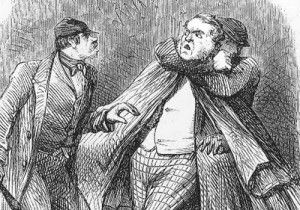Tax hike could just go to pensions
By Wayne Lusvardi
Looks like California won’t need a tax hike after all—except to fund pensions.
Economist Jeff Michael is the director of the University of the Pacific’s Business Forecast Center in Stockton. He tentatively indicates that a proposed state tax hike in November may not be necessary.
Michael was asked to explain the mystery of why Gov. Jerry Brown recently told the Wall Street Journal that the State Gross Domestic Product had increased by $90 billion in 2011, but state Controller John Chiang reports tax revenues were down 22 percent in February 2012 compared to February 2011.
Michael said that the “primary reasons Controller Chiang is reporting tax revenue is down compared to last year is because the previous two-year tax rate increases expired.” The 2-year tax, signed into law by then-Gov. Arnold Schwarzenegger in 2009, was temporary until the economy recovered.
Gov. Brown’s budget does project a revenue increase of about $3 billion, or about 3.5 percent of the general fund, even if his tax-increase initiative fails. Michael said this is not an inflation impact because it is roughly equal to the projected nominal GDP in Brown’s budget.
Michael pointed out that “if the economy picks up a bit more as some project, then nominal GDP growth could be closer to 5 percent. The state could see $4 to $5 billion in revenue growth.”
If a $4 to $5 billion tax revenue increase should materialize, no tax increase might be needed at all. Or at least the tax increase could be smaller.
Another reason Michael says tax revenue isn’t growing is that the Legislature and governor have been holding off balancing the budget. He wrote, “The state will begin the year in a budget hole from this year’s deficit that will certainly exceed the roughly $3 billion in expected revenue growth for next year.” But California has apparently already started spending increases again even before tax revenues have increased.
State Redevelopment Spending Still Out of Control
On March 26, the Legislature was still spending like there was no proverbial tomorrow or state budget deficit. The Assembly approved Assembly Bill 1585, allowing defunct redevelopment agencies to spend $1.4 billion of their remaining $2 billion in revenues for affordable housing. The money would be spent instead of transferring it to the state general fund to plug the state budget deficit.
State funding for affordable housing programs is unnecessary as long as the median state home price is $239,000. This is 67.4 percent below the 2006 peak home price in the real estate market.
Apparently the governor and legislature believe they can go back to their old tax and spending habits because of a rise in state Gross Domestic Product.
Brown Puffs Up State GDP for Tax Hike?
Speaking at a conference at the Wall Street Journal over the weekend, Brown said the state Gross Domestic Product rose by $90 billion, or 4.7 percent last year. However, the website usgovernmentspending.com reports that California’s GDP increase was only $58.7 billion for 2011. Economist Jeff Michael estimates that, when final figures are reported for 2011, the state GDP increase might be around $70 billion. Michael added:
“I can’t comment on where he [Brown] got the $90 billion GDP increase, but 60 or 70 or 90 is generally irrelevant to the necessity of the tax increase and, plus or minus $1 billion to 2 billion on general fund tax revenue which is normal uncertainty.”
Bottom Line
The governor is apparently puffing up the state’s increased GDP for 2011 to justify that there is an economic recovery to pay for a tax rate increase. But if there were a $90 billion increase in state GDP, as Brown contends, there would be no need for a tax rate hike. Existing tax rates would generate enough revenue, combined with budget balancing and more redevelopment fund transfers to avoid any need for a tax increase.
The Legislature is holding off balancing its budget for this year to make it appear that there is a deficit requiring a tax rate hike.
The Assembly’s approval of AB 1585, authorizing spending $1.4 billion in redevelopment housing fund,s indicates it doesn’t want to balance the state budget. By denying the general fund this $1.4 billion, the Legislature would make it appear it is running a larger budget deficit and, thus, needs a tax rate increase.
If the above rosy scenario should take place, the state could see taxes rise on their own by $5 billion due to economic growth. On top of that would be slapped could reap a $10 billion tax windfall — if the voters approve Brown’s tax increase.
Where would the windfall go? Let’s spell it: P-E-N-S-I-O-N-S.
Related Articles
Blueprint Shows Budget Can Balance
MAY 14, 2011 This piece first appeared in City Journal’s new California Web site edited by Ben Boychuk. By STEVEN
Brown may seek new tax increases on 2016 ballot
California lawmakers have left Gov. Jerry Brown in the lurch. That was Brown’s judgment of the Legislature’s performance, which has
New public funding plan: Seize home mortgages
June 7, 2013 By Wayne Lusvardi With pension costs sapping budgets, governments at all levels are coming up with novel




